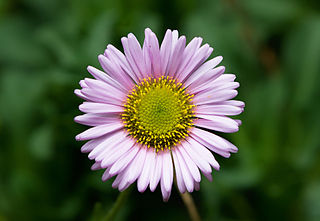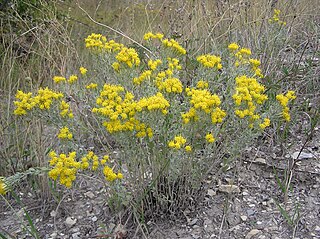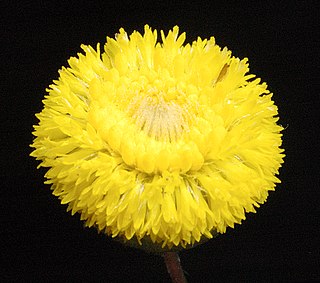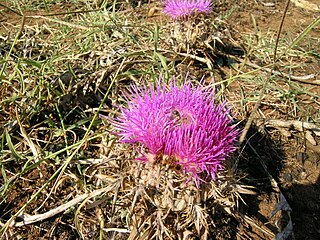
The curry tree or Bergera koenigii, is a tropical and sub-tropical tree in the family Rutaceae, native to Asia. The plant is also sometimes called sweet neem, though M. koenigii is in a different family from neem, Azadirachta indica, which is in the related family Meliaceae.

Nyctaginaceae, the four o'clock family, is a family of around 33 genera and 290 species of flowering plants, widely distributed in tropical and subtropical regions, with a few representatives in temperate regions. The family has a distinctive fruit type called an accessory fruit or anthocarp, and many genera have extremely large pollen grains.

Glebionis coronaria, formerly called Chrysanthemum coronarium, is a species of flowering plant in the family Asteraceae. It is native to the Mediterranean region. It is cultivated and naturalized in East Asia and in scattered locations in North America.

Astereae is a tribe of plants in the family Asteraceae that includes annuals, biennials, perennials, subshrubs, shrubs, and trees. They are found primarily in temperate regions of the world. Plants within the tribe are present nearly worldwide divided into over 250 genera and more than 3,100 species, making it the second-largest tribe in the family behind Senecioneae.

The Cardueae are a tribe of flowering plants in the daisy family (Asteraceae) and the subfamily Carduoideae. Most of them are commonly known as thistles; four of the best known genera are Carduus, Cynara, Cirsium, and Onopordum.

Aetheolaena is a genus of flowering plants in the aster family, Asteraceae.

Cylindrocline is a genus of flowering plant in the family Asteraceae.

Jurinea is a genus of flowering plants in the family Asteraceae.

Galatella is a genus of flowering plants in the family Asteraceae, native to Europe, Asia, and northern Africa.

Lucilia is a genus of South American flowering plants in the tribe Gnaphalieae within the family Asteraceae.
Jurinea modesta is a species of flowering plant in the family Asteraceae, native to Afghanistan and west Pakistan. It was first described by Pierre Edmond Boissier in 1856.

Panaetia, a genus in the Asteraceae (daisy) family, was first described by Henri Cassini in 1829 It is considered by Plants of the World Online and the Global Compositae Database to be a synonym of Podolepis Labil,. while GBIF states it as "doubtful". However, in 2021, the Western Australian Herbarium accepted Jeffery Jeanes new circumscription of the genus, together with two species of Panaetia as being found in Western Australia: Panaetia lessonii, and Panaetia tepperi. Jeanes distinguished Panaetia from the genera, Podolepis, Siemssenia and Walshia, using the following characters:
- the outer florets are all tubular; and
- the cypselas are minutely tuberculate and lack long finger-like papillae.
Plants of the World Online (POWO) is an online database published by the Royal Botanic Gardens, Kew. It was launched in March 2017 with the ultimate aim being "to enable users to access information on all the world's known seed-bearing plants by 2020". The initial focus was on tropical African Floras, particularly Flora Zambesiaca, Flora of West Tropical Africa and Flora of Tropical East Africa.

Chamaeleon gummifer, also known as distaff thistle or stemless atractylis, is a thistle in the Chamaeleon genus. Formerly, it was placed in the Atractylis genus. It is native to the Mediterranean basin, where it can be found in various habitats, including cultivated- or uncultivated fields and forests. It is a perennial herb producing a stemless, pinkish flower. The plant has a history of use in folk medicine, but it is very toxic due to the presence of atractyloside and carboxyatractyloside.

Leptinella scariosa is a small flowering plant in the daisy family, native to Argentina, Chile, and the Falkland Islands. Its specific epithet, scariosa is derived from Latin, meaning membranous or scar-like.
Jurinea cretacea is a species of flowering plant in the family Asteraceae, native to Ukraine and south European Russia. It is confined to chalk outcrops.













